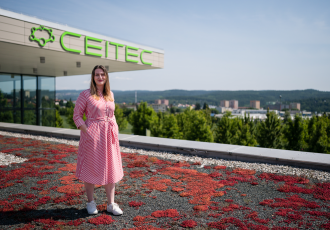6. Dec. 2023
Reportedly, as many as 4 out of 10 people are diagnosed with some of cancer at some stage of their lives. Affected by her personal experience with her grandmother’s battle with cancer, Michaela Vojníková has developed a desire to help cancer patients. She considered becoming an oncologist but as such, she would be limited to using established treatments. Therefore, she decided to become a researcher instead, striving to come up with new non-invasive treatments for this destructive disease and find a “cure for cancer”.
Michaela Vojníková is a PhD student in Advanced Nanotechnology at CEITEC BUT and also a researcher in nanomedicine laboratory at Mendel University. Apart from being a successful researcher, she also works as a mentor for a group of graduate students, introducing them to the wonders of science, and engages in science popularisation with her Instagram account Chémia života and her podcast Chci vědět as well as participating in summer schools, science slams and others.
In the laboratory, she focuses on the production of lipid nanoparticles, so-called liposomes, which she says can be thought of as “round, double-layered cages” used to transport pharmaceuticals. She has already managed to develop theranostic nanoparticles which not only heal but are also detectable by magnetic resonance imaging (MRI). “This is extremely important,” Michaela explains, “because this way, we know exactly where the nanoparticles are and how many there are, and that allows for extremely customised, tailor-made treatment. Moreover, these nanoparticles are stable, meaning they can be transported between the pharmaceutical company and the hospital at room temperature without breaking down.”
Michaela intends to continue her research and examine the so-called lipobots: these are theranostic nanoparticles which also have the character of intelligent nanorobots. She says, “This cherry on top would become a very innovative ending to my dissertation.” For that reason, she applied for a Fulbright scholarship with the idea of continuing her research in the US with Prof. Joseph Wang. He is one of the top researchers in this area and therefore his research group can offer multidisciplinary expertise to bring this idea to life.
Fortunately, Michaela’s research objectives resonated with the commission and she has been officially accepted by both the Slovak (Michaela has Slovak citizenship) and the American side. Since Professor Wang was immediately excited about Michaela’s research, he agreed to accept her in his research group at the University of California San Diego (UCSD). Michaela is thus double lucky: not only did she get a Fulbright scholarship, but she was also granted space at the university of her choice. She is leaving in August 2024 and intends to spend there between 6-9 months.
Congratulations to Michaela and good luck with your research – may you indeed find the elusive “cure for cancer”!


 Share
Share


